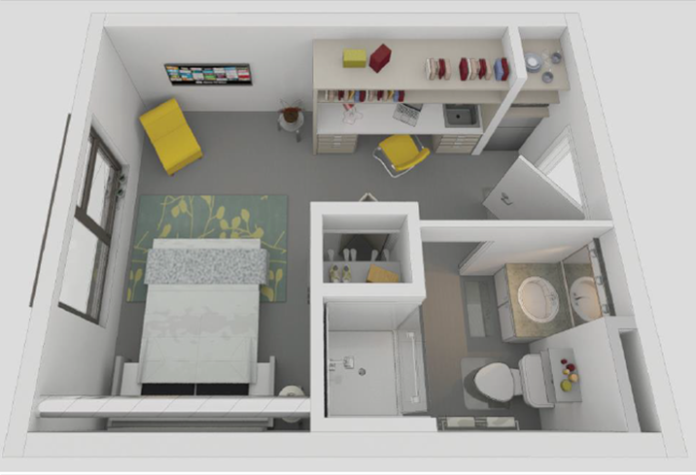The owners of Skipjack Resort & Marina have an interesting proposal for the City of Marathon: Let them take 109 rooms at the resort, convert them into affordable housing units, and then sell off the transient rental rights to build more hotel rooms.
While that’s a familiar scenario in the Florida Keys right now, as permits for new construction dwindle, it diverges in two ways. One, the affordable housing units might be very small, as small as a basic hotel room. Two, it would require the city to change its Comprehensive Plan and Land Development Regulations to allow for higher densities — 25 units per acre — in a Mixed Use Zone.
“This allows hotels and motels to develop affordable housing within their existing room structures, without losing density. It only takes a very short period of time to renovate a hotel room into an apartment that would be deed restricted,” said Barbara Mitchell of Mitchell Planning and Design, who pitched the idea to the council on March 26 for her client, Republic Investment which owns Skipjack Resort. “If we go through the rezoning process, we lose the primary benefit of what we are trying to accomplish — which is immediate relief for the affordable housing shortage.”
Whether the property is rezoned, or the comp plan and LDRs is revised, either would have to be approved by the state Department of Economic Opportunity in Tallahassee.
Republic Investment’s Darren Smith, who also lives in Marathon, said the affordable housing situation in Marathon is “dire.”
“I live here. I know,” he said.
“If we get the approval to do this, I can have some units up and ready within 90 days, not the year and a half it takes for new construction,” Smith said. “After the storm, we asked ourselves, ‘What’s the highest and best use for the asset? And what’s best for the community?’ We think this is it.”
Skipjack has 150 units spread over eight buildings on the north side of the Florida Keys Country Club golf course. The units include studios, one-bedroom and two-bedroom apartments. About 40 are privately owned condos, with uses ranging from fulltime residency to short-term rentals. Republic Investments owns the remaining units.
Some members of the Marathon City Council had reservations about turning hotel rooms into affordable housing. Councilman Mark Senmartin questioned the square footage of the hotel rooms. “I don’t see 325 square feet as being sufficient. I think we need to stick to the city’s standard of a minimum of 375 square feet.”
Smith said that’s not a problem because some of the villas have still not been completely renovated.
“It’s a blank slate for us. We can remodel these in such a way as to be 375 square feet or 425 square feet,” he said, adding it’s a simple matter to install kitchens. “Whatever we have to do, to accommodate any requirement, we will do. We would be funding the project ourselves, and we already have contractors in place ready to start the work.”
While self-funded projects get off the ground much easier and faster, tax-credit projects come with a state-backed guarantee that the rents will actually be affordable.
Marathon Mayor John Bartus doesn’t object to the small quarters.
“A lot of Marathon’s jobs are in the service industry. I don’t think the tenant cares about a dishwasher; they care if they have a roof over their heads at a reasonable cost,” Bartus said. “I am willing to move forward and check out this possibility to see if it will work with fractional allocations.”
Republic Investment would have to request the affordable housing building allocations from the City of Marathon. The allocations are almost gone ahead of the 2023 deadline imposed by the state, when there will be no more market rate or affordable housing allocations for new construction. And of the 300 “new” allocations granted by then-Gov. Rick Scott after Hurricane Irma, all but 60 are spoken for. Right now, Keys governments work on a first-come, first-served basis. Once a project is approved, and the allocations granted, the developer removes his share from the pool and begins to build. (That’s because some deals fall through, and the allocations are returned to the pool.) And the jury’s still out on the extra 300 affordable allocations — a Marathon resident has challenged the city’s increase in affordable housing, on the grounds it could negatively affect safe hurricane evacuation. That case will go before an administrative judge on April 30 through May 3.
But fractional allocations could make allocations go further. For example, in Marathon a developer who is granted an affordable housing allocation can build anything between 375 and 1,800 square feet. It’s more profitable to build or rent a larger unit, based on the scarcity of building rights. In the Florida Keys, only Key West has “fractional allocations” written into its Comp Plan. In other words, three small units with fractional allocations could equal two affordable housing allocations. Marathon has never asked the state Department of Economic Opportunity for the ability to grant fractional units. Such a request would also likely take months for approval in Tallahassee.
Councilman Dan Zieg said he prefers the Habitat for Humanity model and wants to be “judicious” in allocating the remaining affordable unit construction rights. Zieg and Councilman Mark Senmartin raised the impacts on wastewater and traffic if the Skipjack units are converted into full-time rentals.
“This is a new wrinkle for a developer to make more money,” said Zieg. “I don’t see the city gets much out of it.”
Smith said if the changes to the ComprehensivePlan and LDRs are approved, he’s not sure what he would do with the transient rental rights. Right now, they have a combined value of almost $9 million — or $80,000 per right for each new hotel room constructed — in the private market. The ability to sell transient rental unit rights incentivizes the developer to build affordable housing as another avenue for revenue.
“We would probably be looking for other sites in Marathon to transfer them to, and perhaps build a hotel,” Smith said.
The request will be heard again at the next meeting of the Marathon Council on Tuesday, April 9 at 5:30 p.m. at Marathon City Hall.
The current densities for affordable housing in Marathon:
Residential High Zone: 15-25
Residential Mobile Home Zone: 25
Mixed Use Zone: 15

























